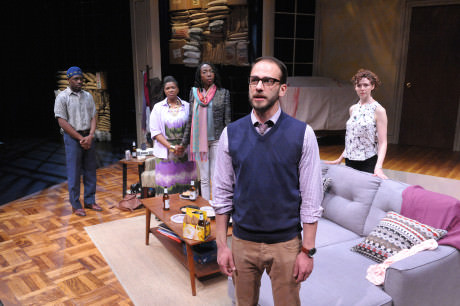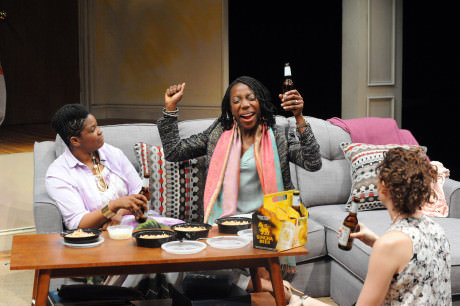
“We didn’t ask to solve the world’s problems; we asked for a baby,” bemoans Annie (Tessa Klein), a thirtysomething white American who with her thirtysomething white American husband, Peter (Jonathan Feuer)—ensconced in their comfortable American home—are attempting to adopt an orphaned infant from Africa. The process gets more complicated than they expected.
Next door to Annie and Peter lives an African émigré, Alemu (Bru Ajueyitsi), who drops by and speaks vividly of the endemic poverty and disease in his native continent, as scenically beautiful as it is. Alemu functions as a reality check on Annie and Peter’s parenting plans, which blithely presume that cross-cultural adoption will ameliorate the unhappiness of failing for several years to conceive a full-term baby themselves. “You want a child from Africa, but you don’t want Africa,” he tells Annie.
And boom. The play’s packed political charge detonates.
As performed, the play seems far more personal than political. But everywhere it veers is a minefield of meta meaning.
The play is particularly personal for Barfield, who is biracial African-American and same-gender-loving and who with her white partner has adopted two children from Ethiopia. She told an interviewer from Out: “I don’t think of myself as a political playwright…. I’m just a human playwright. The same way I don’t like being labeled a gay playwright or a female playwright. Are you a black playwright? That’s not the way I think.”
Yet Barfield’s own life standpoint evidently accounts for two fascinating characters inThe Call that amplify the play’s political theme beyond Annie and Peter’s entitled life crisis. They are a same-gender-loving African-American couple, Drea (Kelly Renee Armstrong) and Rebecca (Joy Jones), who are Annie and Peter’s friends (and, as Peter lets us know, their only black ones). When the play begins, Drea and Rebecca have, yes, come to dinner.
Drea and Rebecca regale Annie and Peter with tales of their recent trip to Africa: unforeseen hazards of a safari, being viewed as “white” Americans. And two things about them immediately stand out. One is that these two women deeply love each other; these are fully rounded characters in a committed same-sex relationship; there is no “drama” about that. It’s what it is.
The other thing is that their lives are also conspicuously first world. They can afford to be tourists in a foreign land where there is famine.
Set Designer Tim Jones has brilliantly located the play’s portrayal of privilege against a backdrop of poverty. The set is a multi-use unit: it functions as living room, bedroom, art museum, public park. Installed above, behind, and to the side is haunting humanitarian cargo—bales and crates of USAID food packed for shipment abroad. That fraught freight is never mentioned in the script. It just looms. Eloquently.
Director Shirley Serotsky has shaped a show that flows accessibly and engagingly, keeping the text’s many trenchant messages within the context of credible character relationships. Lighting Designer Garth Dolan has neatly focused our attention on each scene in each locale, creating a cinematic sense of movement though the set stays put. And Sound Designer Palmer Hefferan has framed the action with energetic music tracks that evoke, remarkably, a hybrid of first and third world. (Note that the Sprenger Theatre is subject to “sound bleed” from performances in adjacent spaces, which I mention not as a defect in the production but as something good to know going in. Because I had not been so advised, I was now and then distracted and perplexed as to the meaning of what I mistakenly took to be sound cues from The Call. Once I guessed what was what, the extraneous sounds were easy to tune out.)

The play’s worthy ambition and the production’s excellent execution notwithstanding, The Call requires a kind of attention not typical of Theater J’s more explicitly political fare. Its contents and portents take a while to come forth from beneath the surface of what is rather conventional domestic dialog, and the script can feel discursive at times—there’s a lot of lengthy storytelling about what happened elsewhere that doesn’t self-evidently serve the storytelling of the drama right in front of us. But wait for it. Once The Call comes through, you get a powerful connection between two worlds.
Running Time: One hour 45 minutes including one intermission.
The Call plays through May 31, 2015 at Theater J performing at The Paul Sprenger Theatre at Atlas Performing Arts Center – 1333 H Street NE, in Washington, D.C. For tickets, purchase them online.




